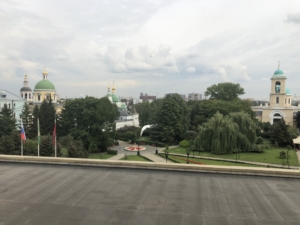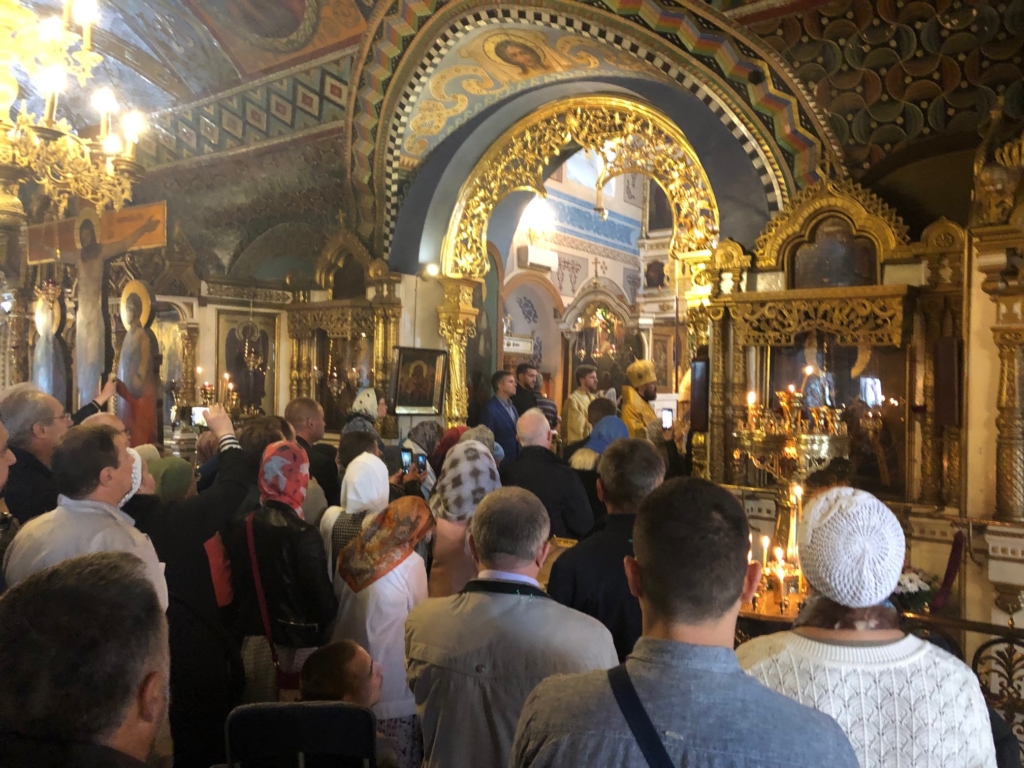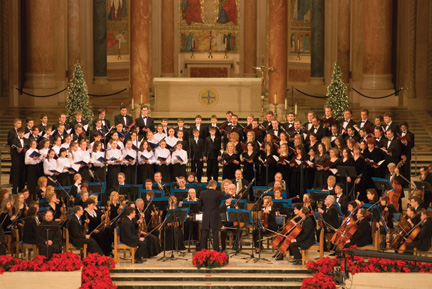Above, St. Basil’s Cathedral at the end of Moscow’s Red Square in the center of the city
From the desk of Robert Moynihan, currently in Russia as part of a delegation with the Urbi et Orbi Foundation. This is his latest Moynihan Letter (#40 for 2019) explaining why he is there and, in part, the mission side of our work at Inside the Vatican magazine and Inside the Vatican Pilgrimages:
Writing from Moscow, on a cool day in mid-July.
 I have been here about 20 times in the last 20 years. I have had the privilege to come to know Russian Orthodox Patriarch Kirill and Metropolitan Hilarion, and Roman Catholic Archbishop Tadeusz Kondrusiewisz and Paolo Pezzi, and so many others. These visits and all that has concerned these relationships have seemed like living twice — because of the veil of myth and mystery associated with Soviet Russia, and pre-Soviet Russia, and the great hopes and tragic failures of these generations.
I have been here about 20 times in the last 20 years. I have had the privilege to come to know Russian Orthodox Patriarch Kirill and Metropolitan Hilarion, and Roman Catholic Archbishop Tadeusz Kondrusiewisz and Paolo Pezzi, and so many others. These visits and all that has concerned these relationships have seemed like living twice — because of the veil of myth and mystery associated with Soviet Russia, and pre-Soviet Russia, and the great hopes and tragic failures of these generations.
The city of Moscow itself — after a Rome with dumpsters overflowing with trash — seems very clean, almost sparkling. Not a cigarette butt or gum wrapper in sight. (Photo, right-view from Dr. Moynihan’s hotel room)
The crowds walking in Red Square seem to be mainly families with children. The thought that there would ever be a war on these people, a nuclear exchange, seems nightmarish.
We are here with our Urbi et Orbi Foundation on our 6th annual pilgrimage to Russia and eastern Europe.
Our goal is to try to build bridges of understanding between separated Christians, especially between Catholics (us) and Orthodox (whether in Russia or Ukraine or Greece or Istanbul) — separated since 1054, the date of the “Great Schism.” We would like to help lay the possible foundation for further steps — already taken by so many others in so many ways — to overcome the schism and reunify the eastern and western “lungs” of Christianity.
And as a corollary, we would like to do what little we can to assist in establishing friendships which may play some small role in improving relations between the United States and Russia.
My own motivation is largely personal, something that dates back to my childhood and has to do with the stories I heard of the message of Fatima. The thought, the hope, is that faith returns and flourishes in these regions, and that from that, peace is deepened and flourishes throughout the world.
Our thought for 20 years now has been to observe, to see what has happened to the former Soviet Union and East bloc, in political and cultural terms, but especially in terms of Christian faith.

Above, Divine Liturgy, July 14, 2019
We now have several projects our Foundation supports, especially an annual two-week exchange between Moscow and Rome of a dozen young people, who over the next 50 years will have perhaps a role to play in deepening inter-Church understanding.
We also are proposing that the Russian people open a Russian Academy in Rome, similar to the American Academy in Rome (of which I am a former fellow), the British School of Rome, and the Ecole Francaise de Rome. But there is no Russian Academy in Rome.
In Rome, Gian Maria Vian, a patristics scholar and former editor of the Osservatore Romano and President of the Committee that overseas all of the foreign academies in Rome, has said to me that no single action could do more to deeply tie Russia into the cultural life of the West than opening a Russian Academy in Rome.
I have a meeting on this topic now…
*****
Below is a history of our work leading up to the creation of the Urbi et Orbi Foundation:
- April 1993: Urbi et Orbi Communications launches Inside the Vatican, a monthly magazine on Church and world affairs as seen from Rome
- 1994: Urbi et Orbi Communications becomes a co-publisher with the US bishops’ conference of The Catechism of the Catholic Church
- 1994-1998: Inside the Vatican magazine grows to be one of the most respected and influential magazines in the Catholic world
- 1999: Following Pope John Paul II’s vision that Europe should “breathe with two lungs,” East and West, Orthodox and Catholic, we began to work to improve Catholic-Orthodox relations through common cultural and social projects. We visited with Archbishop Tadeusz Kondrusiewicz in Moscow, met Archimandrite Hilarion Alefeyev, and consulted with the Pope’s secretary, Don Stanislao Dsiwisz, in Rome.
- 2000: We found support for translating the 5-volume history of Christian doctrine by the late Prof. Jaroslav Pelikan from English into Russian in collaboration with the Russian Orthodox Patriarchate of Moscow. The project was led by Father Igor Vyzhanov
- 2001: Launch of our “Oral History Project” to interview survivors of World War II: On the morning of October 16, 1943, just at dawn, the German SS soldiers in Rome began going house to house in the Jewish ghetto, arresting Jews. But something unprecedented happened. The Germans only found about 1,000 of Rome’s 10,000 Jews. Almost all of them were hidden in Catholic convents and monasteries, and in Vatican City, next to the residence of Pope Pius XII himself. We are locating these survivors, now in their 70s, 80s, and 90s, and interviewing them. Their stories make up one of the most remarkable and moving unknown stories of the Nazi period. We plan to expand this project to include other historical periods.
- 2001–2004: In 2001, we hosted a group of Russians in Rome in October; the group met with Pope John Paul II. At the end of 2001, we negotiated and found support for a special concert by a Russian Orthodox children’s choir, which flew from Moscow to Rome to sing in St. Peter’s Basilica for the Pope on New Year’s Day, 2002.
-
- During several trips to Russia, we came to know the remarkable story of the disappearance and rediscovery of the holy icon of Our Lady of Kazan, known as “the protection of Russia.” Meeting with the Pope’s secretary and with officials of the Russian Orthodox Church, we worked to bring about the icon’s return. The icon returned to Russia on August 28, 2004.
- 2005: We published long interviews with leading Orthodox thinkers, including Bishop Hilarion Alfeyev and Metropolitan Kirill. In these interviews, the Russian Church leaders expressed interest in working together with Catholics against the growing secularization of Europe and the world (this was just after the death of Pope John Paul II on April 2, 2005)
- 2006: We helped support, and attended, a watershed Catholic-Orthodox conference in a castle in Vienna, Austria. There, for five days in early May, Church leaders were able to get to know one another and discuss issues freely. The conference, organized by the “Pro Oriente” Foundation in Vienna, was entitled “To Give a Soul to Europe,”and is now regarded as having marked a “breakthrough” in Catholic-Orthodox relations.
- 2007: We supported and organized a concert in Rome on March 29th, in which a Russian Orthodox orchestra and choir performed “The Passion of St. Matthew,” a work composed by Russian Orthodox Bishop Hilarion Alfeyev.
- Urbi et Orbi Communications supported the delivery to Kazan, Tatarstan, of several sacred relics from Italy on May 13, and the discussion of future common work to fight alcoholism in Russia.
- Urbi et Orbi Communications supported and organized, later in 2007, an exhibit on the “Spiritual Renewal of Russia” in the Basilica of the National Shrine of the Immaculate Conception in Washington, D.C. At the same time, we supported and organized the performance of a “Christmas Oratorio” by a Russian orchestra and choirs in Washington, New York, and Boston on December 17, 18, and 20. (Photo, below)

- 2008: We supported a commemorative “Requiem for the Romanovs” in Moscow, a concert and exhibition recalling the lives and deaths of the last Russian czar, Nicholas II, and his family on July 16th, 2008. We supported a concert of Christmas music held in Vienna, Austria, on December 22.
- We celebrated the Fifteenth Anniversary of Inside the Vatican, and we took our first ITV pilgrimage group to Rome and Assisi.
- 2009: The electronic Moynihan Report was launched, modeled after a series of “News Flashes – from the desk of Robert Moynihan” in e-mail form.
- 2010: We inaugurated the practice of lodging pilgrims who travel with us in the Domus Sanctae Marthae inside Vatican City
- 2012: In December, we formalized our work by creating the Urbi et Orbi Foundation. The focus of the foundation is to “build bridges” between Christians, especially in the East and the West, in defense of our common beliefs.
- The Moynihan Letters, an online collection of Dr. Moynihan’s e-mail reports on the Church and world affairs was developed.
- 2013: We celebrated twenty years of the continuous publication of Inside the Vatican magazine.
- The Urbi et Orbi Foundation supported the following with a grant:
- Constantine Sigov, head of the St. Clement’s Center in Kiev, Ukraine for general support
- A summer project in Kharkiv, Ukraine, helping dozens of Orthodox children with physical handicaps to participate more easily in the life of their schools and communities.
- The respected Russian Orthodox Metropolitan Filaret in Minsk, Belarus, who hosted an important Catholic-Orthodox theology conference in November 2013.
- A “Concert for Peace” in November in Rome, which we organized in partnership with the Russian Orthodox “St. Gregory the Theologian Foundation” of Moscow, founded by Russian Orthodox Patriarch Kirill and Metropolitan Hilarion. We worked closely with several offices in the Vatican, especially the Pontifical Council for Cultural and the Pontifical Council for Christian Unity. Cardinal Kurt Koch and Cardinal Gianfranco Ravasi, the heads of those two Councils, attended both the event and a reception preceding the concert. After the concert, both cardinals thanked the Urbi et Orbi Foundation for making this important event a reality.
- The Urbi et Orbi Foundation supported the following with a grant:
- 2014: The Urbi et Orbi Foundation supported with a significant and timely grant the fourth Orthodox-Catholic Forum in Minsk, Belarus in June, which brought together Orthodox and Catholic bishops from around Europe to discuss religious freedom in the increasingly secularized society of Europe.
- In July, the Urbi et Orbi Foundation held its first pilgrimage, to Moscow, Istanbul, Vienna, and Rome to seek counsel on the next steps that could be most fruitful in our effort to build Church unity.
- In December, the Urbi et Orbi Foundation held a dinner in Washington, D.C. at the Papal Nunciature. The two-day event also included an opening Mass at St Matthew’s Cathedral and a roundtable at the National Press Club.
- Since 2015, Urbi et Orbi Foundation has continued an annual pilgrimage to Moscow, Istanbul, Vienna and Rome, continuing to take steps towards building bridges towards church unity as well as continuing work on our various related projects. In 2018, our pilgrimage was in Russia during the 100th anniversary of the execution of Tsar Nicholas and his family. Click HERE to go to our Russia country page to view a video about that moving experience.
You may help support this important mission work by making a recurring or one-time donation. Click HERE to be taken to the page to make your donation.









Leave A Comment
You must be logged in to post a comment.